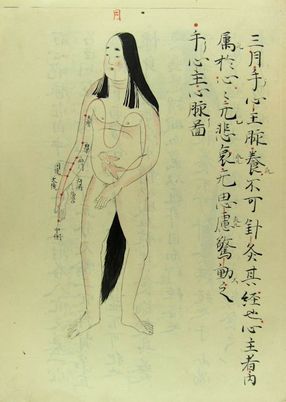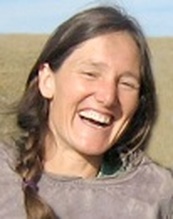 May 25-26th, 2013 14 CEU's Unearthing the Treasure of Classical Chinese Gynecology by Returning to the Roots: Studying Gynecology in the First 1000 Years of Chinese Medical Literature In this weekend of text study, we will translate and contemplate the key passages on the medical treatment of women in the Chinese classical medical tradition, from the Huáng Dì Nèi Jīng 黃帝內經 (“Inner Classic of the Yellow Emperor,” Han dynasty) to Sūn Sīmiǎo’s 孫思邈 Bèi Jí Qiān Jīn Yào Fāng 備急千金要方 (“Crucial Treatments Worth a Thousand in Gold to Prepare For Emergencies”) to Qi Zhongfu’s Nü Kē Bǎi Wèn 女科百問 (“Hundred Questions on Gynecology”) and other Song dynasty classics. In terms of content, we will look at the special characteristics of women’s developmental stages through childhood, menarche, the reproductive years, and menopause and aging. Following the Chinese tradition, we will then focus our attention most specifically on the significance of female Blood (in the form of menstruation, fertility, nurturance to the fetus during pregnancy, and breast-feeding) and the effects, positive AND negative, of women’s reproductive processes. Throughout the course, we will consider the significance of these insights in regards to clinical diagnosis and treatment. Much of this priceless information has never before been translated and has therefore been routinely ignored in modern TCM-style representations of Chinese gynecology, to the great detriment of the profession and your patients. By now, it is well known that Chinese medicine has priceless treatments for such standard gynecological concerns as menstruation or fertility, for which biomedicine lacks satisfying answers. But even beyond that, the deep insights expressed in the classics into the functioning, symbolism, and beauty of female physiological processes present powerful and much needed perspectives on the female body that will have a profound impact on how you approach your female patients and their care. Objectives: - Translation of key passages from classical medical literature on gynecology, much of which are not translated elsewhere. - Familiarity with the basic concepts of classical Chinese gynecology - Creation and discussion of a rudimentary vocabulary of Chinese technical terms in gynecology that will lay the foundations to access later literature on your own. - Mastery of important recurring patterns in classical Chinese grammar by explaining and practicing them in class. - Sensitivity to the beauty, power, and depth of the classical Chinese perspective on the female body in health and illness. - Ability to evaluate concrete tools for diagnosis and treatment, based on a new, deeper understanding of gynecology that aims at achieving true health instead of just treating symptoms.
Prerequisites: This is a translation class. A basic knowledge of classical Chinese is required, but you do not need to be advanced, or even intermediate! The texts will be emailed to participants 2 weeks ahead of time; to get the best out of this opportunity to study with Dr. Wilms, it is recommended to prepare the texts before class. We will then go over the translation in detail at the seminar. Tuition: Practitioner, early bird (before April 15th): $275 Practitioner, regular price: $325 Student: $200 For more information and to register, please call (415)250-8508 or email [email protected]. Outline Day One 9-10:15 Introduction to - classical medicine and the ideal of Nurturing Life - Women in Chinese culture vis-a-vis our own cultural blinders and biomedical views 10:30-11:50 Gender Differences in the Early Classics: Sù Wèn 素問 and Jīn Guī Yào Lüe 金櫃要略 12:00-1:30 Lunch Break 1:30-2:20 Sūn Sīmiǎo’s 孫思邈 Gynecological Volumes in the Bèi Jí Qiān Jīn Yào Fāng 備急千金要方 : An Introduction and Overview 2:30-3:45 Why Women are Different: Introduction from the Qiān Jīn Fāng 千金方 (Treatments Worth a Thousand in Gold) 4:00-5:00: Embryology and Treatments for Nurturing the Fetus: Mawangdui 馬王堆, Taichanshu 胎產書 and Ishimpo 醫心方 Day Two 9-9:50 Introduction to Song Gynecology 10-10:50 Female Blood: Fine-Tuning Menstruation in the Fu Ren Da Quan Liang Fang 婦人大全良方 (Compendium of Good Formulas for Women) 11-12 Menstruation in the Nü Kē Bǎi Wèn 女科百問 (“Hundred Questions on Gynecology”). Lunch Break 12-1:30 1:30-2:20 The Ideal of a Natural Birth: The Shí Chǎn Lùn 十產論 (Discussion of the Ten Kinds of Childbirth”) 2:30-3:20 Postpartum Care: The Qiān Jīn Fāng 千金方 (Treatments Worth a Thousand in Gold) 3:30-5 A Basic Formula: Sì Wù Tāng 四物湯 (Four Ingredient Decoction) from the Tài Píng Huì Mín Hé Jì Jú Fāng太平惠民和劑局方 and its later discussion as a postpartum treatment. Biography: Sabine Wilms, PhD. Sabine has been studying classical Chinese writings on medicine ever since her PhD program in Asian Studies and medical Anthropology. While her academic background has given her a solid foundation in early Chinese philosophy, science, and cosmology and therefore in a historically and culturally sensitive approach to classical Chinese medicine, she also enjoys an ethnomedical approach to Chinese medicine as a living, clinically effective, and ever-changing response to any given cultural environment. She focuses her research and teaching on gynecology, reproduction, and “nurturing life,” as understood in the broadest sense by the great medieval “King of Medicinals” Sun Simiao. Sabine is happiest when engaging in a dialogue with practitioners on how to make this ancient wisdom come alive in our modern times. Following in Sun Simiao’s footsteps, she spent many years dividing her time between writing and lecturing on Chinese medicine and raising goats, poultry, bees, and apples on her small biodynamic farm in the mountains of Northern New Mexico. She currently resides in the mountains of Portland, Oregon, and teaches at National College of Natural Medicine. Her publications include: Pathomechanisms of the Five Viscera (translator, separate books on the Heart, Liver, Lung, Spleen, and Kidney, 2005-2007, Paradigm Publications); Bei Ji Qian Jin Yao Fang, Essential Prescriptions worth a Thousand in Gold for Every Emergency: Volumes 2-4 on Gynecology (The Chinese Medicine Database, 2007); Chinese Medicine in Infertility (co-edited with Andreas Noll; Thieme Publications, 2009); The Great Compendium of Acupuncture and Moxibustion, Zhen Jiu Da Cheng, Volume 1 (The Chinese Medicine Database, 2010); Formulas from the Golden Cabinet with Songs (The Chinese Medicine Database, 2010) Jin Gui Yao Lue: Essential Prescriptions of the Golden Coffer (co-authored with Nigel Wiseman, forthcoming by Paradigm Publications). Concise Introduction to Chinese Medicine (co-authored with Nigel Wiseman, forthcoming by Paradigm Publications). Bei Ji Qian Jin Yao Fang, Essential Prescriptions worth A Thousand in Gold for Every Emergency: Volume 5 on Pediatrics (forthcoming 2013). Comments are closed.
|

 RSS Feed
RSS Feed